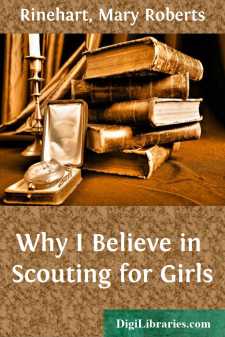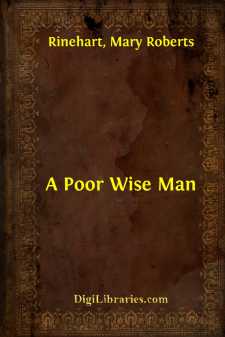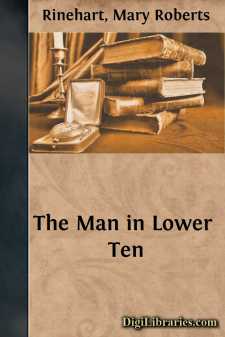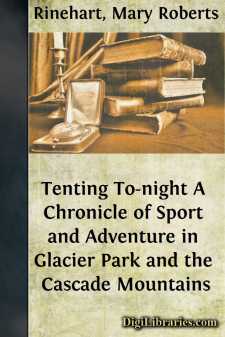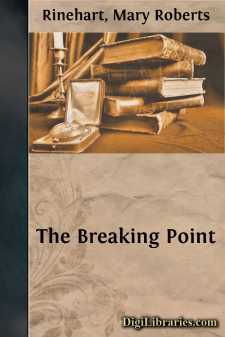Categories
- Antiques & Collectibles 13
- Architecture 36
- Art 48
- Bibles 22
- Biography & Autobiography 815
- Body, Mind & Spirit 144
- Business & Economics 28
- Children's Books 18
- Children's Fiction 14
- Computers 4
- Cooking 94
- Crafts & Hobbies 4
- Drama 346
- Education 58
- Family & Relationships 59
- Fiction 11833
- Games 19
- Gardening 17
- Health & Fitness 34
- History 1378
- House & Home 1
- Humor 147
- Juvenile Fiction 1873
- Juvenile Nonfiction 202
- Language Arts & Disciplines 89
- Law 16
- Literary Collections 686
- Literary Criticism 179
- Mathematics 13
- Medical 41
- Music 40
- Nature 179
- Non-Classifiable 1768
- Performing Arts 7
- Periodicals 1453
- Philosophy 65
- Photography 2
- Poetry 896
- Political Science 203
- Psychology 44
- Reference 154
- Religion 515
- Science 126
- Self-Help 85
- Social Science 82
- Sports & Recreation 34
- Study Aids 3
- Technology & Engineering 59
- Transportation 23
- Travel 463
- True Crime 29
Mary Roberts Rinehart
Mary Roberts Rinehart (1876–1958) was an American writer often dubbed the "American Agatha Christie" for her prolific output of mystery novels and plays. She is best known for pioneering the "had I but known" narrative style and for her popular "The Bat," which later inspired the creation of Batman. Rinehart's work also includes adventure fiction and plays, making significant contributions to the genres of mystery and suspense.
Author's Books:
Sort by:
Girls are great idealists. No one familiar with the working of the girl mind can fail to recognize how quickly they respond to ideals. They dream dreams, not of success, but of happiness. They look up rather than out. But they are vague and uncertain, full of wistful yearnings that lead nowhere. Given a cause and a leader, and they will bring to it an almost pathetic eagerness, staunchness, loyalty,...
more...
I The stage on which we play our little dramas of life and love has for most of us but one setting. It is furnished out with approximately the same things. Characters come, move about and make their final exits through long-familiar doors. And the back drop remains approximately the same from beginning to end. Palace or hovel, forest or sea, it is the background for the moving figures of the play. So...
more...
CHAPTER I The city turned its dreariest aspect toward the railway on blackened walls, irregular and ill-paved streets, gloomy warehouses, and over all a gray, smoke-laden atmosphere which gave it mystery and often beauty. Sometimes the softened towers of the great steel bridges rose above the river mist like fairy towers suspended between Heaven and earth. And again the sun tipped the surrounding hills...
more...
CHAPTER I. THE CROWN PRINCE RUNS AWAY The Crown Prince sat in the royal box and swung his legs. This was hardly princely, but the royal legs did not quite reach the floor from the high crimson-velvet seat of his chair. Prince Ferdinand William Otto was bored. His royal robes, consisting of a pair of blue serge trousers, a short Eton jacket, and a stiff, rolling collar of white linen, irked him. He had...
more...
TWENTY-TWO I The Probationer's name was really Nella Jane Brown, but she was entered in the training school as N. Jane Brown. However, she meant when she was accepted to be plain Jane Brown. Not, of course, that she could ever be really plain. People on the outside of hospitals have a curious theory about nurses, especially if they are under twenty. They believe that they have been disappointed in...
more...
CHAPTER I. I GO TO PITTSBURG McKnight is gradually taking over the criminal end of the business. I never liked it, and since the strange case of the man in lower ten, I have been a bit squeamish. Given a case like that, where you can build up a network of clues that absolutely incriminate three entirely different people, only one of whom can be guilty, and your faith in circumstantial evidence dies of...
more...
THE TRAIL The trail is narrow—often but the width of the pony's feet, a tiny path that leads on and on. It is always ahead, sometimes bold and wide, as when it leads the way through the forest; often narrow, as when it hugs the sides of the precipice; sometimes even hiding for a time in river bottom or swamp, or covered by the débris of last winter's avalanche. Sometimes it picks its...
more...
I "Heaven and earth," sang the tenor, Mr. Henry Wallace, owner of the Wallace garage. His larynx, which gave him somewhat the effect of having swallowed a crab-apple and got it only part way down, protruded above his low collar. "Heaven and earth," sang the bass, Mr. Edwin Goodno, of the meat market and the Boy Scouts. "Heaven and earth, are full—" His chin, large and fleshy,...
more...
Chapter I. AT LEAST I MEANT WELL When the dreadful thing occurred that night, every one turned on me. The injustice of it hurt me most. They said I got up the dinner, that I asked them to give up other engagements and come, that I promised all kinds of jollification, if they would come; and then when they did come and got in the papers and every one—but ourselves—laughed himself black in the face,...
more...
It is doubtful if Aggie and I would have known anything about Tish's plan had Aggie not seen the advertisement in the newspaper. She came to my house at once in violent excitement and with her bonnet over her ear, and gave me the newspaper clipping to read. It said: "Wanted: A small donkey. Must be gentle, female, and if possible answer to the name of Modestine. Address X 27, Morning...
more...


